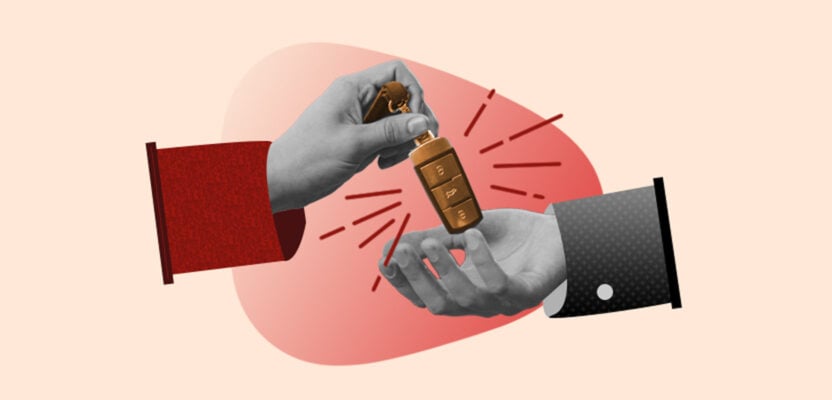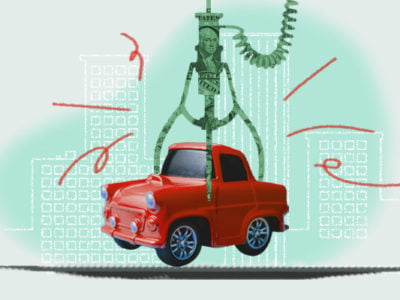Table of Contents
What is voluntary repossession?
Voluntary repossession or voluntary surrender is when you choose to give up property that you’re financing (such as a car) because you can’t afford to pay your loan off. (In this context, “financing” refers to taking out a loan to buy a piece of property and using that property to secure the loan.)
Voluntary repossession exists in contrast to involuntary repossession, where your lender dispatches someone to seize your property because you’ve stopped making payments on your loan.
What types of property can be voluntarily surrendered?
Most types of property that can be financed can also be surrendered or repossessed, including appliances, furniture, and jewelry. However, cars and other vehicles are the items that most often come to mind when people think of repossession (both voluntary and involuntary).
In all cases, repossession is specific to secured loans, where the collateral is the item you’ve purchased. Because unsecured loans don’t have collateral, lenders can’t repossess your property (either voluntarily or involuntarily) if you default on them, although lenders of unsecured loans can still sometimes claim your property if they sue you for nonpayment and the court enters a judgment against you.
How does voluntary repossession work?
With voluntary repossession, you agree on a time and place to return an item you’ve financed to your lender. After that, your lender may sell it privately or at a public auction to cover your debt.
If your property sells for less than the amount you owe, you may be required to pay the difference (known as the deficiency balance). 1 Conversely, if the item sells for more than your debt is worth, your lender is normally required to give you the surplus.
How much does a voluntary repossession affect your credit score?
Repossessions are considered “derogatory marks” on your credit report, which means that they can seriously damage your credit.
However, it’s unclear how FICO and VantageScore (the two main credit scoring companies in the US) differentiate between involuntary and voluntary repossession when calculating your credit score. Experian notes that a voluntary repossession “might hurt your score slightly less” than an involuntary repossession, but they haven’t said whether this is always the case or just a possibility. 2
Prospective lenders look more favorably upon voluntary repossession than involuntary repossession because it suggests that you took responsibility for your debt and tried to make things easier on the creditor who had to repossess your property.
However, if you have a repo of any sort on your credit report, most lenders will still probably view you as a higher-risk borrower and may be reluctant to offer you a loan. If you need to take out another loan after a repossession, you may need to settle for a much higher interest rate than you’d otherwise have gotten.
Negative marks that are commonly associated with repossession
Your credit score will take a bigger hit if you incur any of the following negative marks on your credit report before or after the repossession:
- Late payments: A repo on your credit report will often be accompanied by one or more late payments. If you’re 30+ days behind on your bills, your lender will probably report it to the credit bureaus (Equifax, Experian, and/or TransUnion), which will further damage your credit score. 3
- Charge-offs: If you surrendered your property but it wasn’t worth enough to cover your debt, then your lender may charge off your remaining debt (declare it as a loss) if they think you won’t pay them back. Charge-offs hurt your credit score even more than late payments do. 4
- Collections: After charging off your debt, your lender might sell or transfer it to a debt collection agency if they weren’t able to cover their losses by selling your property. This will cause a collection account to appear on your credit report.
How long does a voluntary surrender stay on your credit report?
Like most negative items, all repossessions stay on your credit report for seven years, starting from the date your lender reported your first late payment. 5 Voluntary and involuntary repos aren’t different in this respect.
Pros and cons of voluntary repossession
In general, if you can avoid a repo, you should do so. However, if you can’t, a voluntary repo will almost always be better than an involuntary one.
Before making a decision, take some time to consider both the advantages and disadvantages of voluntary repossession.
Pros of voluntary surrender
Voluntary repossession has three key advantages:
- You save money: If you don’t do anything about a defaulted loan and your creditor forcibly seizes your property, you’ll usually have to pay the towing fee. You can avoid this fee with voluntary surrender.
- It’s more convenient: If your auto lender decides to repossess your car, they don’t need to notify you—they can even use GPS tracking devices to find and tow your car. 6 You can generally avoid a lot of stress with voluntary surrender because you get to choose when and where to hand your property over.
- Lenders prefer it: As mentioned, most lenders (as well as the credit scoring models) treat voluntary repossession more favorably than involuntary repossession. If you can’t avoid the repo entirely, surrendering your property may protect your credit at least a little bit. It will also make your former lender more favorably disposed to you if you try to buy your car back after the repossession.
Cons of voluntary surrender
There are also a couple of downsides to voluntarily surrendering your vehicle or another item (on top of the obvious downside that you’ll lose your property):
- Your credit score will still drop: Voluntary repossession is still a negative mark on your credit report, and willingly returning your car to your auto lender won’t spare your credit score from damage. Once your lender reports your repo to the credit bureaus, you’ll see an immediate drop in your credit score, and it might take a long time to recover.
- You’ll still have to pay the deficiency balance: If your lender isn’t able to fully compensate for their losses by selling your property, they’ll probably try to collect the rest of your debt, regardless of whether the repossession was voluntary or involuntary.
Alternatives to voluntary repossession
To make a fully informed decision, you need to know what your other options are. Here are a couple of alternatives to voluntary repossession:
- Negotiate for a new agreement: If you’re struggling to pay off your loan, try negotiating with your lender for a new repayment plan with a longer term. This generally means you’ll pay more interest in the long run, but your monthly payments will get smaller and more manageable.
- Sell the item yourself: If you sell your property on your own, you might be able to get more money back than what your lender would have gotten, which would allow you to clear a greater portion of your debt. However, you usually need to get your lender’s permission first because they have a lien on the property, which means they technically own it until you’ve fully paid off your loan.
- Try a balance transfer: If you’re struggling to pay off your loan because the interest payments are too high, you might be able to take out a new credit card with an 0% APR introductory period and use it to pay off your loan. This is known as a balance transfer. You’ll still have to pay off the same amount of debt, but this will buy you time, and if you pay it off before the introductory period ends, you won’t have to pay any interest.
Takeaway: Willingly returning a secured asset to your lender is known as voluntary repossession.
- Voluntary repossession is an alternative to involuntary repossession that gives you some control over how your lender takes back ownership of a secured asset such as a vehicle.
- A voluntary repo is classed as a derogatory item and will remain on your credit report for up to seven years. However, it may look better to lenders than an involuntary repo.
- Voluntary surrender may spare you stress and save you money (i.e, by enabling you to avoid towing fees).
- As an alternative to car repossession, you can try negotiating with your lender for a more manageable repayment plan. You can also try selling your car yourself.







